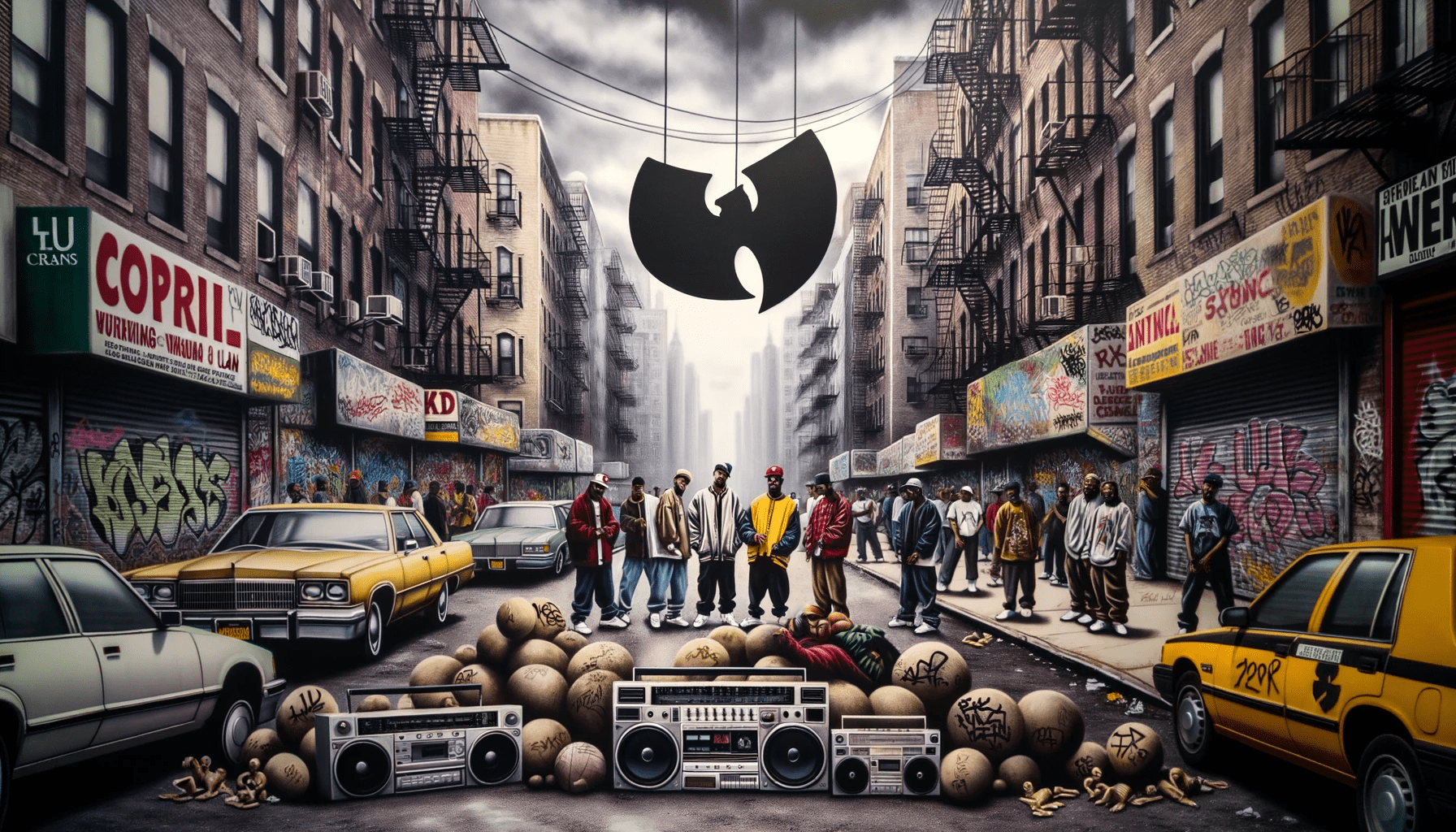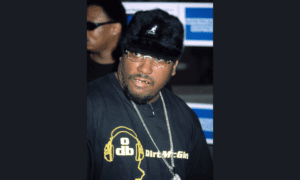
Wu-Tang Clan Members
Wu-Tang Clan Members: RZA, Ol’ Dirty Bastard, GZA, Method Man, Ghostface Killah, Masta Killah, U-God, Raekwon, Inspectah Deck, Cappadonna
Background on Wu-Tang Clan Members
The Wu-Tang Clan, often shortened to Wu-Tang, represents an unprecedented fusion of individual artistry and collective ambition. This dynamic group from Staten Island, New York, burst onto the scene in the early 1990s, radically reshaping hip-hop’s sound, style, and ethos. With myriad distinct voices and personalities, the Wu-Tang Clan members created a symphony of lyrical complexity, rawness, and unique production techniques that remain influential today. And the group still releases new music.
Few groups equal the achievements of Wu-Tang. Their unique blend of gritty East Coast rhymes, laced with philosophical insights and metaphors derived from Asian martial arts films, set them apart. The Clan’s impact isn’t just confined to their lyrical prowess. Their innovative approach to branding, from adopting the iconic “W” logo to releasing a myriad of Wu-Tang Clan albums, influenced multiple generations of artists. The Clan defied industry norms by allowing its members to sign individual deals with various labels, ensuring their presence was ubiquitous and their influence widespread.
The name “Wu-Tang” was inspired by the 1981 martial arts film “Shaolin and Wu-Tang.” Watch the trailer below:
Just as the film depicted two powerful martial arts schools, the Wu-Tang Clan Members set out to blend their individual strengths into a cohesive force that could challenge any adversary in the rap industry.
Understanding the Importance of All of the Wu-Tang Members
Diving deep into the essence of Wu-Tang requires a nuanced understanding of its members. Each brought a unique flavor to the table, crafting an ensemble that was greater than the sum of its parts. Whether it was RZA’s unparalleled production skills, GZA’s intellectual lyrical depth, Ol’ Dirty Bastard’s unpredictable energy, Method Man’s charismatic flow, Raekwon’s New York Times side stories, or Ghostface Killah’s viciously emotional surrealism, every member had a role to play.
And while their collective efforts birthed iconic Wu-Tang Clan albums, their solo ventures also showcased their individual brilliance. Recognizing the significance of each member is crucial to truly appreciating the Clan’s contribution to hip-hop and global music culture. Read on for a breakdown of each member, their contributions to the Wu-Tang Clan, and their solo endeavors.
Pioneering a New Era in Rap Music
The arrival of Wu-Tang Clan was not just a breath of fresh air; it was a gust of wind strong enough to shift the industry’s landscape. Their music and ethos showcased the importance of unity while celebrating individuality.
Each member brought a distinctive style and flow, allowing for a varied yet cohesive listening experience. Tracks like “C.R.E.A.M” and “Protect Ya Neck” became anthems of a generation, setting the precedent for what hip-hop could be when stripped of its pretenses and grounded in authenticity.
Related: “C.R.E.A.M.” by Wu-Tang Clan: Cash Ruling for 30 Years
Moreover, Wu-Tang’s approach to business was equally groundbreaking. Allowing members to ink individual deals outside the Clan redefined artist empowerment, ensuring their war-marching ascendence to legendary status.
RZA: Wu-Tang’s De Facto Leader
Early Life and Inspiration
Born as Robert Fitzgerald Diggs in Brownsville, Brooklyn, RZA’s initial brushes with music came from a deep family connection to soul and rhythm. His journey from the harsh realities of urban life to the helm of one of hip-hop’s most iconic groups is one of resilience, vision, and sheer talent.
The early exposure to a diverse range of sounds, from Motown classics to the rhythmic beats of traditional African music, laid the foundation for RZA’s unique production style, featuring off-kilter samples from a variety of sources. His passion for martial arts films further infused his work, giving the Wu-Tang Clan a distinctive edge.
While the hip-hop scene of the early ’90s was predominantly characterized by its West Coast dominance, Wu-Tang brought back the spotlight to the East Coast with its raw, unfiltered sound. Their debut album, “Enter the Wu-Tang (36 Chambers),” released in 1993, was a sonic masterpiece that introduced the world to the “Wu-Tang” sound. Unlike anything heard before, it was a blend of gritty beats, kung-fu samples, and a unique lyrical approach.
A crucial factor that set the Wu-Tang Clan albums apart was their production. RZA’s innovative use of sped-up soul samples and minimalist, off-kilter beats laid the foundation for a hauntingly raw sound.
Role within the Clan
As one of the founding Wu-Tang Clan Members, RZA wasn’t just a contributor but the general of the group’s unique sound. With his fingers on the pulse of both the creative and business aspects, he ensured that the Clan stood out musically and in their approach to the industry.
Guided by a philosophy of collective strength, RZA negotiated landmark deals that allowed members to pursue solo deals while remaining a cohesive unit. His vision ensured that Wu-Tang was not just a group but a powerful brand.
RZA’s Production Style and Genius
RZA’s production genius amalgamates raw, minimalist beats, eclectic samples, and a deep understanding of rhythm. He masterfully blended elements from soul, funk, and even snippets from kung-fu movies, creating a soundscape that was uniquely Wu-Tang.
Tracks such as “Da Mystery of Chessboxin'” and “Wu-Tang Clan Ain’t Nuthing Ta F’ Wit” showcase his ability to elevate a song through his meticulous layering and sound choices.
While RZA’s solo output isn’t as strong as many other Wu members, there is some strong material, particularly his work with the Gravediggaz.
Essential RZA Solo Album:
“Birth of a Prince”
Key Solo/Non-Wu-Tang Tracks:
“Biochemical Equation” ft. Wu-Tang Clan, MF DOOM
“Grits”
“Diary of a Madman” by Gravediggaz
Best RZA Verse on a Wu-Tang Song:
“Triumph”
GZA: The Genius
From ‘Words from the Genius’ to ‘Liquid Swords’
As one of the foundational Wu-Tang Clan Members, GZA holds a special place in the pantheon of hip-hop greats. GZA’s sophomore solo effort, “Liquid Swords,” solidified his position as a lyrical virtuoso. The album, laden with introspective narratives and razor-sharp wordplay, stands as one of the essential Wu-Tang Clan albums.
Intellectual Lyrics and Delivery
GZA’s moniker, ‘The Genius,’ isn’t mere hyperbole. A depth of knowledge characterizes his verses, blending street wisdom with references spanning science, philosophy, and chess, among other subjects. This intellectual approach sets him apart in the world of hip-hop, drawing listeners into intricate tales that demand more than just a casual listen.
His smooth yet deliberate delivery ensures that every word and syllable holds weight. Whether weaving tales of street escapades or breaking down the complexities of life, GZA’s cadence and flow remain impeccable.
Essential GZA Solo Album:
“Liquid Swords” is a bonafide classic.
Key GZA Solo/non-Wu Tracks:
“4th Chamber”
“Guillotine (Swordz)” ft. Ghostface Killah, Inspectah Deck, Raekwon
Best Verse on a Wu-Tang Song:
“Protect Ya Neck”
Method Man: The Charismatic Emcee
Method Man’s Distinctive Voice and Flow
In the realm of hip-hop, few voices are as immediately recognizable as that of Clifford Smith, better known by his stage name, Method Man. One of the standout Wu-Tang Clan Members, Method Man’s unique voice, marked by its gravelly undertones and smooth flow, sets him apart. The cadence and rhythm of his delivery intertwine seamlessly with his lyrics, resulting in a sonic experience that’s distinctly “Meth.”
Solo Career and Acting Ventures
While his contributions to Wu-Tang Clan albums remain legendary, Method Man’s solo endeavors have also gained significant acclaim. His debut solo album, “Tical,” showcased his prowess as a singular force within hip-hop. Songs like “Bring the Pain” and “All I Need” achieved commercial success and have become hip-hop staples over time.
Outside of music, Method Man’s charisma translated effortlessly onto the screen. His ventures into acting led him to various roles in movies and TV shows, solidifying his position as a multi-talented icon in the entertainment industry. From gritty crime dramas to comedic appearances, Method Man’s versatility shines brightly, proving that his talents are not confined to the microphone.
Dynamic Duos: Collaborations with Redman
A significant chapter in Method Man’s illustrious career revolves around his collaborations with fellow rapper Redman. Their chemistry, both on and off the stage, is undeniable. Albums like “Blackout!” showcased the duo’s unparalleled synergy with hard-hitting and playful tracks. Their collaborative efforts go beyond music, with the pair co-starring in films and television projects, further demonstrating their dynamic compatibility.
Essential Method Man Solo Album:
“Tical”
Key Tracks:
“Bring Tha Pain”
“Meth vs. Chef”
“Da Rockwilder”
Best Verse on a Wu-Tang Song:
“Method Man”
Ol’ Dirty Bastard: The Wild Card
The Unpredictability and Raw Energy of ODB
Within the ensemble of Wu-Tang Clan members, Ol’ Dirty Bastard (ODB) stood out as an unpredictable force. He embodied raw energy, spontaneity, and an unapologetic approach to his craft. This distinctiveness, coupled with his raspy voice and idiosyncratic style, rendered him a wildcard in every sense of the term. With an ability to oscillate between comedic antics and blunt lyricism, ODB constantly kept fans on their toes.
Memorable Moments and Controversies
Ol’ Dirty Bastard’s career was a medley of memorable moments and controversies. His unrestrained behavior, both onstage and off, often made headlines. Whether it was rushing the stage during the Grammys to declare “Wu-Tang is for the children” or his multiple run-ins with the law, ODB’s actions consistently drew attention. However, beyond the tabloid fodder, these moments provide insight into the unfiltered personality that defined his life and music.
His contributions to Wu-Tang Clan releases were unforgettable, bringing a unique flair to tracks with his unparalleled energy. Songs like “Shimmy Shimmy Ya” and “Brooklyn Zoo” from his debut album “Return to the 36 Chambers: The Dirty Version” reveal his exceptional talent, blending humor, raw emotion, and audacity in ways few artists have replicated. Tragically, Ol’ Dirty Bastard’s life was cut short in 2004.
Essential ODB Solo Album:
Related: Learn more about ODB’s other classic record.
Key Ol’ Dirty Bastard Tracks:
“Brooklyn Zoo”
“Shimmy Shimmy Ya”
“I Got Your Money”
Best Verse on a Wu-Tang Song:
Raekwon: The Chef
‘Only Built 4 Cuban Linx…’ and its Impact
Arguably one of the most profound Wu-Tang Clan albums, Raekwon’s debut solo project, “Only Built 4 Cuban Linx…” often referred to as “The Purple Tape,” is heralded as a cornerstone in hip-hop’s storied legacy. Released in 1995, this opus wasn’t just a showcase of Raekwon’s lyrical prowess but a narration of the gritty realities of street life intertwined with mafioso rap themes. Raekwon painted cinematic tales alongside Ghostface Killah, vividly taking listeners through underworld sagas, cementing the album as an unparalleled classic.
Find out which Raekwon album made it onto our list of the greatest hip-hop albums ever.
Signature Storytelling Style
Raekwon, also known as “The Chef,” carved out a unique space for himself with his intricate storytelling technique among Wu-Tang Clan members. His lyrics are often laden with complex slang and coded language, giving listeners a distinct immersion into his tales. Raekwon’s storytelling wasn’t about mere bragging rights; it was an art form – a chronicle of experiences, observations, and reflections from his life on the streets of Staten Island. This narrative depth added layers to Wu-Tang’s collective discography and elevated the Clan’s lyrical pedigree.
Collaborations and Culinary References
Raekwon’s moniker “The Chef” is no arbitrary title. It hints at his ability to cook up a lyrical storm, blending various ingredients from his life, experiences, and collaborations to serve a feast for the ears. His collaborations with fellow Wu-Tang Clan Members, especially Ghostface Killah, are the stuff of legends. Tracks like “Criminology” and “Verbal Intercourse” epitomize the synergy, leading to some of the most iconic verses in hip-hop history.
Moreover, Raekwon’s frequent culinary references in his lyrics and titles, such as “Ice Cream” and “Fry Chicken,” prove his knack for seamlessly integrating everyday themes with deeper narratives, creating a flavorful concoction of street tales and life lessons.
And the sequel to “Only Built for Cuban Linx” lived up to the hype.
Essential Raekwon Solo Albums:
“Only Built for Cuban Linx”
Related: CLASSIC HIP-HOP ALBUMS RELEASED IN AUGUST
“Only Built for Cuban Linx Part Two”
Key Tracks:
“Crimonology”
“Incarcerated Scarfaces”
“House of Flying Daggers”
“Black Mozart”
Best Verse on a Wu-Tang Song:
“C.R.E.A.M.”
Ghostface Killah: The Soulful Storyteller
Emotional Depth in Lyrics
Diving deep into the annals of hip-hop reveals a myriad of MCs who’ve graced the mic, but few have demonstrated the lyrical dexterity and raw emotional depth of Ghostface Killah. A standout among Wu-Tang Clan Members, his verses often dance between vivid street tales and introspective musings, tapping into a level of vulnerability rare in the genre. Ghostface’s lyrical canvas is painted with stories of love, loss, triumphs, and regrets, offering listeners an intimate glimpse into his soul.
The ‘Ironman’ and ‘Supreme Clientele’ Era
Ghostface’s brilliance is revealed in “Ironman,” “Supreme Clientele,” and “Fishscale.” The former, his debut solo album, is a sonic masterpiece characterized by its soulful samples and hard-hitting beats. It presented Ghostface as a force to be reckoned with, seamlessly transitioning between aggressive street anthems and tender love ballads.
“Supreme Clientele,” on the other hand, was a testament to his growth as an artist. It showcased an evolved Ghostface, unafraid to experiment with unconventional beats and rhyme schemes. Tracks like “Cherchez LaGhost” and “One” underscored his knack for crafting catchy hooks, while deep cuts like “Child’s Play” delved into nostalgic stories of childhood and innocence.
The Evolution of Ghostface
As the years passed, Ghostface Killah refused to be boxed into any musical style or narrative. His adaptability became evident with albums like “Fishscale” and “The Pretty Toney Album”, where he explored newer sonic terrains, collaborating with diverse producers and artists. Yet, the essence of Ghostface remained unchanged – his unparalleled ability to narrate stories with an emotional resonance that tugged at the heartstrings.
Essential Solo Albums:
“Supreme Clientele”
“Fishscale”
Related: Explore “Fishscale” further here.
Key Tracks:
“One”
“Kilo”
“Whip You With a Strap”
Best Verse on a Wu-Tang Song:
Inspectah Deck: The Slept on Wu-Tang Clan Member
Memorable Verses and Contributions
Within the ranks of Wu-Tang Clan members, Inspectah Deck often flew under the radar, eclipsed by the more flamboyant personalities of his brethren. Yet, to the discerning hip-hop aficionado, Deck’s lyrical prowess and unique delivery made him one of the Clan’s unsung heroes.
From the iconic opening verse of “Protect Ya Neck” to his stellar contributions on “Triumph” and “C.R.E.A.M.,” Deck’s verses often served as the backbone of some of Wu-Tang’s most enduring tracks. His wordplay, steeped in metaphors and intricate rhyme schemes, reveals one of hip-hop’s elite lyricists.
Solo Endeavors and Production Talents
Beyond his contributions to Wu-Tang Clan albums, Inspectah Deck’s solo endeavors showcased his multifaceted talent behind the mic and the production boards. Albums like “Uncontrolled Substance” and “The Movement” were a testament to his lyrical dexterity and highlighted his knack for crafting evocative beats.
While not always achieving mainstream acclaim, these projects were celebrated by the underground for their raw, unfiltered essence of hip-hop. His work with the hip-hop supergroup Czarface, featuring 7L & Esoteric and Inspectah Deck, ranks amongst the best music Wu-members have made over the past decade.
Essential Solo Album:
“Uncontrolled Substance”
Key Tracks:
“Execute Them”
“Elevation”
“Bomb Thrown”
Best Verse on a Wu-Tang Song:
“Triumph”
U-God: The Golden Arms
Voice Distinctiveness and Rhyme Style
U-God’s unique timbre and signature resonance stand out. His deep, gravelly voice contrasted the clan’s array of vocal styles, making him immediately recognizable on any track. Paired with his deliberate rhyme style, U-God delivered rhythmic and powerful verses, ensuring that they left an indelible mark on the listener.
Solo Career Highlights
U-God’s solo ventures allowed him to carve out his niche within the Wu-Tang narrative. Albums like “Golden Arms Redemption” and “Dopium” showcased his lyrical capabilities, ranging from braggadocious rhymes to introspective narratives. These Wu-Tang Clan albums added to the group’s prolific discography and solidified U-God’s standing as a formidable emcee in his own right.
“Golden Arms Redemption” (1999): U-God’s debut solo album, featuring tracks highlighting his unparalleled vocal depth and intricate storytelling.
“Dopium” (2009): An album that showcased a more experimental side of U-God, blending traditional Wu-Tang sounds with newer, contemporary beats.
Essential Solo Album:
“Golden Arms Redemption”
Key Tracks:
“Turbulence”
“Black Jesus”
Best Verse on a Wu-Tang Song:
“Da Mystery of Chessboxin'”
Masta Killa: The Last Disciple
Joining the Clan and Early Contributions
Masta Killa, the last member to officially join the group, swiftly asserted his place among the seasoned Wu-Tang Clan Members with a lyrical prowess that belied his newcomer status. His entry was marked by the iconic closing verse in “Da Mystery of Chessboxin’,” where his fluidity and wordplay stood toe-to-toe with his already-established counterparts.
Mystique and Lyrical Depth
Masta Killa often leaned towards the enigmatic side, allowing his verses to do the talking. Unlike some members who ventured into various media forms, Masta Killa retained an air of mystery, letting his words and Wu-Tang Clan albums resonate more deeply with listeners.
His lyrical depth was characterized by intricate wordplay filled with metaphors, allusions, and complex rhymes that demanded multiple listens. Tracks like “One Blood Under W” and “Old Man” showcased his unique approach to storytelling, weaving tales that traversed both the mundane and the profound.
Essential Solo Album:
“No Said Date”
Key Tracks:
“Old Man”
“Brooklyn King”
“Chains”
Best Verse on a Wu-Tang Song:
“Da Mystery of Chessboxin'”
Cappadonna: The Unofficial Tenth W-Tang Clan Member
Collaborations and Key Verses
Cappadonna, often dubbed the “Unofficial Tenth Member,” graced various Wu-Tang Clan tracks with his distinctive style and voice. His collaborations with the core Wu-Tang Clan Members were nothing short of legendary. His notable verse in “Triumph” remains one of the most memorable in the Clan’s rich tapestry of lyrics, a testament to his skill and synergy with the group.
Solo Career and Notable Albums
While he seamlessly integrated with the Clan’s collective sound, Cappadonna’s solo ventures showcased a unique voice that held its own. Among the pantheon of Wu-Tang Clan albums, Cappadonna’s solo projects, like ‘The Pillage’ and ‘The Ying and the Yang,’ stood out for their individuality, even as they bore the unmistakable Wu-Tang imprint. These albums’ raw energy and lyrical sophistication have added depth to the Wu-Tang narrative.
Relationship and Evolution with the Clan
Though not one of the original members, Cappadonna’s association with the Clan predates their meteoric rise to fame. His relationship with various Wu-Tang Clan Members runs deep, rooted in shared experiences and mutual respect. Over the years, he evolved from an external collaborator to an integral part of the Clan’s legacy, solidifying his position in the Wu-Tang family.
His journey with the Clan, marked by mutual admiration and artistic evolution, epitomizes the Wu-Tang spirit of camaraderie and unity in diversity.
Essential Solo Album:
“The Pillage”
Key Tracks:
“Run”
“97 Mentality”
Best Verse on a Wu-Tang Song:
“Winter Warz”
Wu-Tang Affiliates
Groups and Collectives
- Wu-Tang Killa Beez: A collective of artists supported by the Clan, encompassing a wide range of solo artists and groups.
- 1.4.0. Productions: A Staten Island-based team of producers known for their mixtapes featuring Clan affiliates.
- A.I.G.: A duo known for their debut on the “Wu-Tang Killa Bees: The Swarm” compilation.
- American Cream Team: Formed in 1999, featuring artists like Chip Banks and Polite, and known for their appearance on Raekwon’s albums.
- Black Knights: A Californian group initially associated with North Star, known for their unique collaborations.
- Brooklyn Zu: Closely affiliated with Ol’ Dirty Bastard, this group includes artists like Buddha Monk and 12 O’Clock.
- Killarmy: A group known for its militant style and affiliation with the Clan.
- Sunz of Man: One of the earliest and most influential groups, featuring artists like Killah Priest and Hell Razah.
Notable Solo Artists
- 9th Prince: A founding member of Killarmy, known for his sharp lyrical skills.
- Buddha Monk: A member of Brooklyn Zu and a prolific producer and rapper within the Wu-affiliate network.
- Cilvaringz: A Dutch rapper and producer, known for his work within the Wu-Tang sphere.
- Bronze Nazareth: An acclaimed producer and rapper, contributing significantly to the Wu-Tang sound.
Wu-Tang Clan Members’ Legacy and Influence
Wu-Tang’s Impact on Subsequent Hip-Hop Generations
The Wu-Tang Clan didn’t just leave a mark; they revolutionized the hip-hop genre. Their legacy can be heard echoing through the verses of subsequent generations of rappers. The collective’s unyielding authenticity and innovative sound have inspired many artists to experiment with their craft and challenge the status quo. From chart-toppers to underground hip-hop prodigies, the influence of the Wu-Tang Clan Members can be detected in lyrics, production styles, and even the business strategies of emerging artists.
Continuing the Legacy: Wu-Tang’s Place in Modern Hip-Hop
Even decades after their debut, the Wu-Tang Clan holds a revered spot in the annals of hip-hop history. New-age rappers frequently cite them as a pivotal influence, and their songs remain staples in hip-hop playlists worldwide. The Clan’s commitment to authenticity, innovation, and unity remains a benchmark for modern artists. As hip-hop continues to evolve and reshape itself, the teachings and philosophies of the Wu-Tang Clan Members ensure that their legacy remains eternally relevant.
The Wu-Tang Clan Members’ Saga Ends
The Timelessness of Wu-Tang
The Wu-Tang Clan’s journey through hip-hop’s annals is a testament to their unyielding commitment to authenticity, creativity, and unity. Their emblematic ‘W’ has evolved beyond mere symbolism to represent an entire generation’s passion for hip-hop. When one listens to Wu-Tang Clan albums, it becomes evident that their musical brilliance isn’t confined to a particular era but transcends time. Their raw energy, powerful lyrics, and unique sound have granted them the status of timelessness in a constantly evolving music landscape.
Lessons from the Clan’s Journey
The story of the Wu-Tang Clan Members serves as an inspirational tale for aspiring artists across genres. Their origins, steeped in struggle and perseverance, highlight the following key takeaways:
Unity is Strength: Despite each member’s distinctive style and approach, their collective efforts culminated in some of hip-hop’s most iconic tracks.
Innovation Leads the Way: Their unique approach to production, marketing, and branding set them apart, showing that risks, when calculated, can lead to unmatched rewards.
Stay True to Your Roots: No matter their success, the Clan never drifted from their foundational ethos, ensuring their music remained genuine and relatable.
Wu-Tang Members FAQ
Why did Wu-Tang break up?
The Wu-Tang Clan has not officially broken up. They have had periods of inactivity and internal conflicts, particularly around the late 1990s and early 2000s. Issues like U-God allegedly leaving the group due to disputes with RZA and the death of Ol’ Dirty Bastard in 2004 were significant events. However, the group has continued to work together on various projects over the years.
Who is the 10th member of Wu-Tang?
The 10th member of the Wu-Tang Clan is Cappadonna. He was initially a close affiliate of the group and later became an official member.
Who is the 11th member of Wu-Tang?
Who is the richest Wu-Tang member?
RZA is the wealthiest member of the Wu-Tang.
Check out an exploration of “C.R.E.A.M.”










